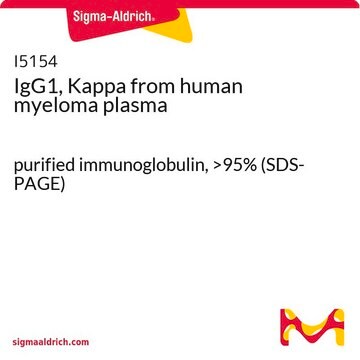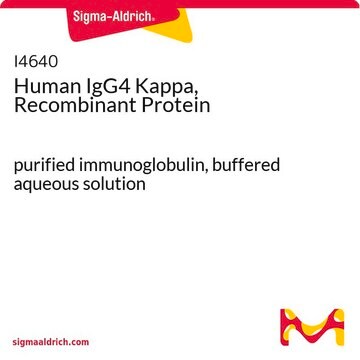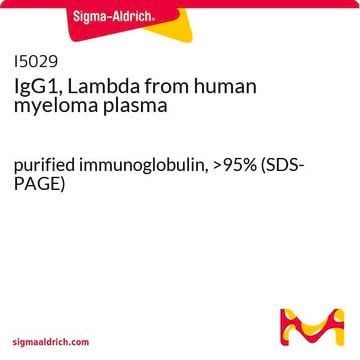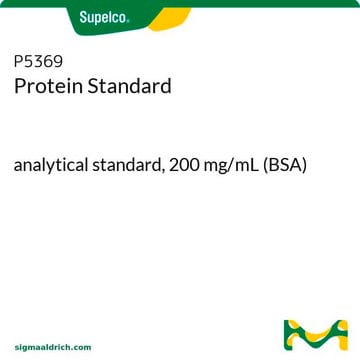I5404
IgG2, Kappa from human myeloma plasma
purified immunoglobulin, >95% (SDS-PAGE)
Synonym(s):
Human IgG2-κ
Sign Into View Organizational & Contract Pricing
All Photos(1)
About This Item
Recommended Products
biological source
human
Quality Level
conjugate
unconjugated
antibody form
purified immunoglobulin
Assay
>95% (SDS-PAGE)
shipped in
dry ice
storage temp.
−20°C
Looking for similar products? Visit Product Comparison Guide
General description
IgG antibody subtype is the most abundant serum immunoglobulins of the immune system. It is secreted by B cells and is found in blood and extracellular fluids and provides protection from infections caused by bacteria, fungi and viruses. Maternal IgG is transferred to fetus through the placenta that is vital for immune defence of the neonate against infections.
Human myeloma IgG2, κ is purified from human plasma by fractionation, ion-exchange and affinity chromatography procedures.
Human myeloma IgG2, κ is purified from human plasma by fractionation, ion-exchange and affinity chromatography procedures.
Application
The purified IgG2, κ may be used as an immunoglobulin calibrator, reference antigen, blocking agent or coating protein in a variety of immunoassays including ELISA, dot-blot immunobinding, Western immunoblotting, immunodiffusion, immunoelectrophoresis, hemagglutination, and cell-binding assays. Human myeloma IgG2, κa was used to characterize the trisulfide modifications in human and mouse antibodies and in flow cytometry.
Physical form
Solution in 0.02 M Tris buffered saline, pH 8.0.
Analysis Note
Identity is determined by immunoelectrophoresis and indirect ELISA.
Disclaimer
Unless otherwise stated in our catalog or other company documentation accompanying the product(s), our products are intended for research use only and are not to be used for any other purpose, which includes but is not limited to, unauthorized commercial uses, in vitro diagnostic uses, ex vivo or in vivo therapeutic uses or any type of consumption or application to humans or animals.
Storage Class Code
10 - Combustible liquids
WGK
WGK 1
Flash Point(F)
Not applicable
Flash Point(C)
Not applicable
Certificates of Analysis (COA)
Search for Certificates of Analysis (COA) by entering the products Lot/Batch Number. Lot and Batch Numbers can be found on a product’s label following the words ‘Lot’ or ‘Batch’.
Already Own This Product?
Find documentation for the products that you have recently purchased in the Document Library.
Customers Also Viewed
Jonatan Dewulf et al.
Cancers, 13(9) (2021-05-06)
The involvement of RANK/RANKL signaling in the tumor microenvironment (TME) in driving response or resistance to immunotherapy has only very recently been recognized. Current quantification methods of RANKL expression suffer from issues such as sensitivity, variability, and uncertainty on the
Sheng Gu et al.
Analytical biochemistry, 400(1), 89-98 (2010-01-21)
Trisulfides are a posttranslational modification formed by the insertion of a sulfur atom into a disulfide bond. Although reports for trisulfides in proteins are limited, we find that they are a common modification in natural and recombinant antibodies of all
Jorn J Heeringa et al.
Allergy, 75(5), 1121-1132 (2019-10-07)
While treatment for atopic rhinitis is aimed mostly to relieve symptoms, only allergen-specific immunotherapy (AIT) is targeted to modify the natural history of allergic diseases. This results in sustained clinical tolerance, even when treatment has stopped. The immunomodulatory effects of
Zhongqi Zhang et al.
mAbs, 11(8), 1381-1390 (2019-08-15)
Human IgG antibodies containing terminal alpha 2,6-linked sialic acid on their Fc N-glycans have been shown to reduce antibody-dependent cell-mediated cytotoxicity and possess anti-inflammatory properties. Although terminal sialylation on complex N-glycans can happen via either an alpha 2,3-linkage or an
Rangaiah Shashidharamurthy et al.
Journal of immunology (Baltimore, Md. : 1950), 183(12), 8216-8224 (2009-12-17)
CD32A, the major phagocytic FcgammaR in humans, exhibits a polymorphism in the ligand binding domain. Individuals homozygous for the R allelic form of CD32A (CD32A(R) allele) are more susceptible to bacterial infections and autoimmune diseases as compared with H allelic
Our team of scientists has experience in all areas of research including Life Science, Material Science, Chemical Synthesis, Chromatography, Analytical and many others.
Contact Technical Service







